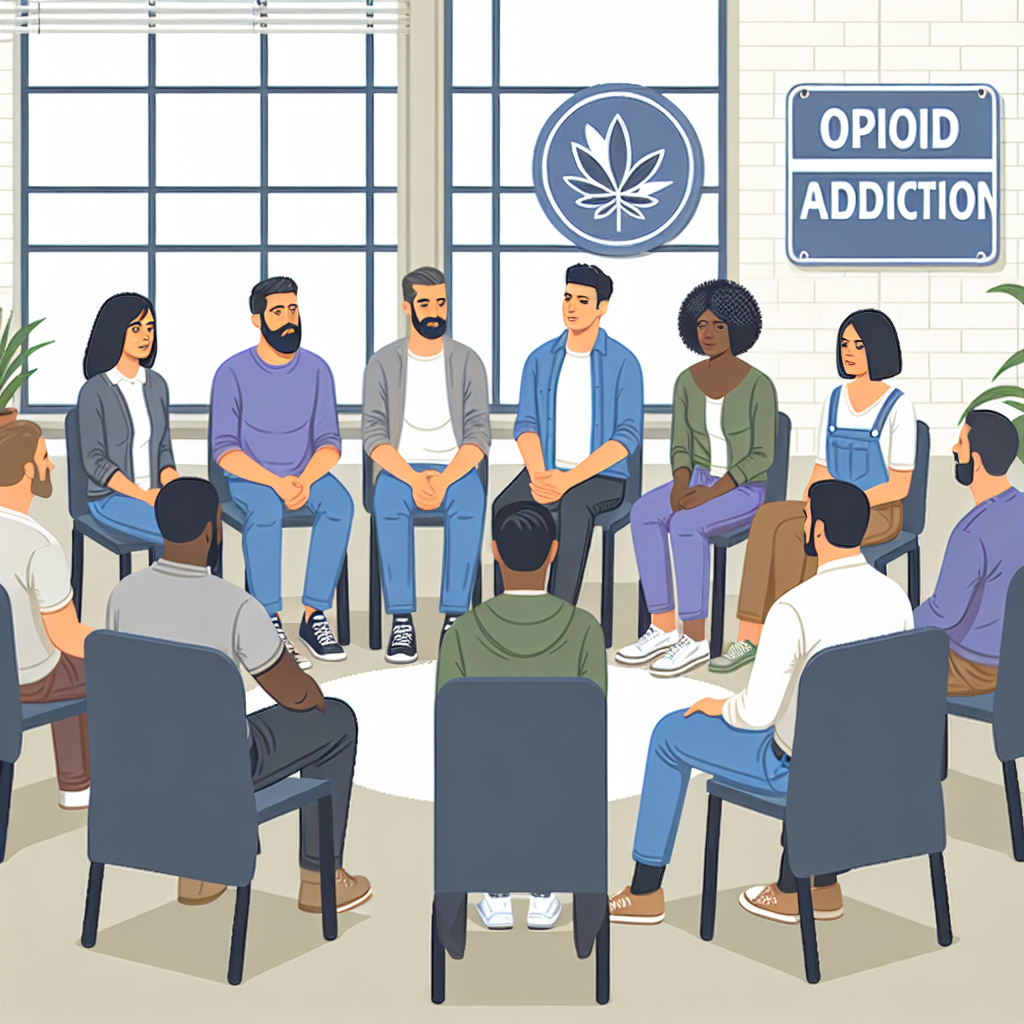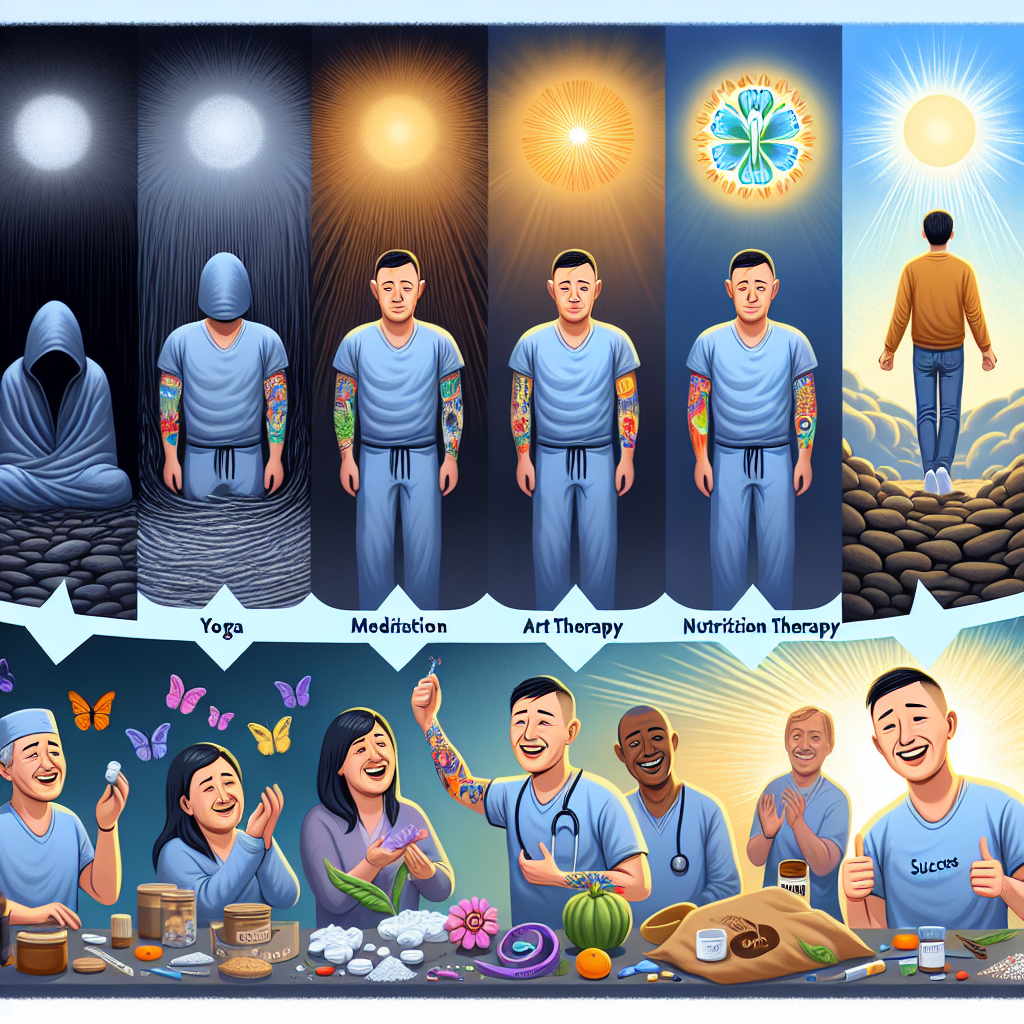-
Table of Contents
“Group Therapy in Heroin Rehab: Healing Together, One Step at a Time.”
Introduction
Group therapy in heroin rehab operates as a cornerstone of the recovery process, providing a structured and supportive environment where individuals can share their experiences, challenges, and successes. This therapeutic approach leverages the power of collective experience, allowing participants to gain insights from others who are facing similar struggles. Facilitated by trained therapists, group sessions focus on fostering open communication, building trust, and developing coping strategies. Through mutual support and accountability, group therapy helps individuals break the isolation often associated with addiction, promoting emotional healing and resilience. By addressing both the psychological and social aspects of addiction, group therapy plays a crucial role in the comprehensive treatment of heroin dependence, aiding individuals in their journey towards sustained recovery.
Benefits Of Group Therapy In Heroin Rehab
Group therapy is a cornerstone of heroin rehabilitation, offering a multitude of benefits that can significantly enhance the recovery process. One of the primary advantages of group therapy is the sense of community it fosters among participants. When individuals struggling with heroin addiction come together in a group setting, they often find solace in knowing they are not alone in their journey. This shared experience can be incredibly empowering, as it helps to reduce feelings of isolation and stigma that are commonly associated with addiction.
Moreover, group therapy provides a platform for individuals to share their stories, challenges, and triumphs. This exchange of personal experiences can be profoundly therapeutic, as it allows participants to gain new perspectives and insights. Hearing about the struggles and successes of others can inspire hope and motivate individuals to stay committed to their own recovery. Additionally, the feedback and support from peers can be invaluable, offering practical advice and emotional encouragement that can make a significant difference in one’s journey to sobriety.
Another key benefit of group therapy in heroin rehab is the opportunity for individuals to develop and practice essential social skills. Addiction often leads to strained relationships and social isolation, making it difficult for individuals to interact effectively with others. In a group therapy setting, participants can work on rebuilding their communication skills, learning how to express themselves constructively and listen empathetically. These skills are crucial for maintaining healthy relationships and can greatly enhance one’s overall quality of life.
Furthermore, group therapy sessions are typically led by trained therapists who can guide discussions and provide professional insights. These therapists can introduce various therapeutic techniques and coping strategies that individuals can use to manage cravings, deal with triggers, and navigate the challenges of recovery. The structured environment of group therapy ensures that discussions remain focused and productive, allowing participants to make meaningful progress in their rehabilitation.
In addition to the emotional and psychological benefits, group therapy can also offer practical advantages. For instance, it can be more cost-effective than individual therapy, making it accessible to a broader range of people. The shared nature of group therapy means that resources can be pooled, allowing for a more comprehensive and holistic approach to treatment. This can include access to educational materials, workshops, and other supportive services that can enhance the recovery process.
Moreover, the accountability that comes with group therapy can be a powerful motivator. Knowing that others are counting on you to show up and participate can encourage individuals to stay engaged and committed to their recovery. This sense of responsibility to the group can help individuals stay on track, even when they face setbacks or challenges.
In conclusion, the benefits of group therapy in heroin rehab are multifaceted and far-reaching. By fostering a sense of community, providing a platform for sharing and learning, enhancing social skills, offering professional guidance, and promoting accountability, group therapy can play a crucial role in helping individuals overcome addiction. The supportive and collaborative environment of group therapy not only aids in the recovery process but also empowers individuals to build a healthier, more fulfilling life. Through the collective strength and shared wisdom of the group, participants can find the hope and resilience they need to achieve lasting sobriety.
Key Components Of Effective Group Therapy For Heroin Addiction
Group therapy is a cornerstone of heroin rehab, offering a supportive environment where individuals can share their experiences, challenges, and triumphs. The key components of effective group therapy for heroin addiction are multifaceted, each playing a crucial role in the recovery process. Understanding these components can illuminate how group therapy works and why it is so beneficial for those battling heroin addiction.
One of the primary elements of effective group therapy is the creation of a safe and non-judgmental space. This environment allows participants to open up about their struggles without fear of criticism or rejection. Facilitators, often trained therapists, play a pivotal role in establishing this atmosphere. They set ground rules that promote respect and confidentiality, ensuring that each member feels valued and heard. This sense of safety is essential for individuals to express their vulnerabilities and begin the healing process.
Another critical component is the sense of community and shared experience that group therapy fosters. Heroin addiction can be an isolating experience, often leading individuals to feel alone in their struggles. In group therapy, participants meet others who have faced similar challenges, which can be incredibly validating and comforting. This shared experience helps to break down feelings of isolation and builds a network of support that extends beyond the therapy sessions. Members often form strong bonds, providing each other with encouragement and accountability, which are vital for long-term recovery.
Moreover, group therapy offers diverse perspectives and solutions. Each participant brings their unique experiences and coping strategies to the table, enriching the collective wisdom of the group. This diversity allows members to learn from each other, gaining new insights and approaches to managing their addiction. For instance, one person’s success in overcoming cravings might inspire another to try a similar strategy. This exchange of ideas can be particularly empowering, as it demonstrates that recovery is possible and that there are multiple paths to achieving it.
Additionally, group therapy sessions often incorporate various therapeutic techniques, such as cognitive-behavioral therapy (CBT), mindfulness, and motivational interviewing. These techniques are designed to help individuals understand the underlying causes of their addiction, develop healthier coping mechanisms, and build resilience. For example, CBT can help participants identify and challenge negative thought patterns that contribute to their substance use, while mindfulness practices can teach them to stay present and manage stress more effectively. By integrating these techniques, group therapy provides a comprehensive approach to treatment that addresses both the psychological and emotional aspects of addiction.
Furthermore, the structure and consistency of group therapy are vital components of its effectiveness. Regular sessions provide a routine that can be particularly beneficial for individuals in recovery, offering a sense of stability and predictability. This structure helps participants stay engaged in their treatment and maintain their commitment to sobriety. Over time, the consistent support and reinforcement from the group can strengthen an individual’s resolve and confidence in their ability to overcome addiction.
In conclusion, the key components of effective group therapy for heroin addiction—creating a safe space, fostering a sense of community, offering diverse perspectives, incorporating therapeutic techniques, and providing structure and consistency—work together to support individuals on their journey to recovery. By participating in group therapy, individuals can find hope, strength, and the tools they need to reclaim their lives from heroin addiction. The transformative power of group therapy lies in its ability to connect people, promote healing, and inspire lasting change.
Q&A
1. **Question:** What is the primary goal of group therapy in heroin rehab?
**Answer:** The primary goal of group therapy in heroin rehab is to provide a supportive environment where individuals can share their experiences, gain insights from others, and develop coping strategies to maintain sobriety.
2. **Question:** How does group therapy help individuals in heroin rehab?
**Answer:** Group therapy helps individuals in heroin rehab by fostering a sense of community, reducing feelings of isolation, and allowing participants to learn from each other’s successes and challenges in overcoming addiction.
Conclusion
Group therapy in heroin rehab works by providing a supportive environment where individuals can share their experiences, challenges, and successes with others who are facing similar struggles. It fosters a sense of community and belonging, reduces feelings of isolation, and allows participants to learn from each other’s coping strategies. Facilitated by a trained therapist, group therapy encourages open communication, accountability, and mutual support, which are crucial for recovery. It also helps individuals develop social skills, build trust, and gain insights into their own behaviors and thought patterns, ultimately contributing to their overall rehabilitation and long-term sobriety.



